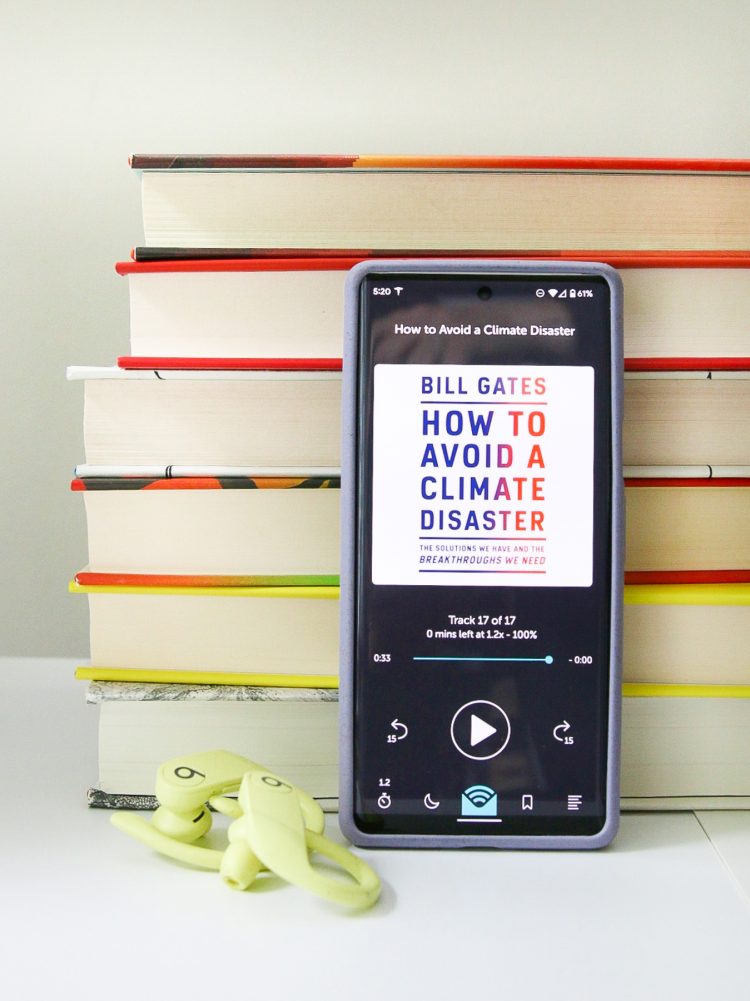Unpaid Review of How To Avoid a Climate Disaster by Bill Gates
Curious about perspectives on climate change from one of the most prestigious and wealthiest people on the planet (if not at least because he has incredible influence)? Read on for a full review of the How to Avoid a Climate Disaster: The Solutions We Have and the Breakthroughs We Need by Bill Gates.

This post contains affiliate links.
A while back, I read Bill Gates’ environmental book called How to Avoid a Climate Disaster: The Solutions We Have and the Breakthroughs We Need (and I’m just finally getting you my review on the book now). I’m nothing if not timely, I guess.
I wasn’t sure what to expect from the book. I suspected Gates would overvalue technology solutions to climate change, given his background, and undervalue regenerative and cultural solutions. But I wanted to read his perspective because I know he has great influence in the investment and neoliberal sustainability worlds. As it turns out, I got pretty much what I expected.
Prioritizing Fiscal Efficiency Makes Sense
Gates opens the book by describing the framework through which he views many climate solutions. Specifically, he compares the anticipated cost of a solution to the projected climate benefit, most specifically in terms of the solution’s corresponding reduction in carbon emissions.
I appreciate his perspective to think of any climate action or climate solution in terms of how expensive it is, how it impacts carbon reduction as a percent of total carbon emissions, and accordingly, how financially efficient it is as a carbon reduction solution.
It makes sense to focus our money and efforts on solutions that have the largest potential impact (i.e. the biggest bang for our buck). At the end of the day, money matters. Costs prevail and profit drives decisions. But given his level of influence, I’d like to see him also discuss with greater conviction climate solutions that aren’t primarily driven by capitalism.
Minimizing Cultural & Regenerative Solutions
Like many neoliberal voices, I think Gates minimizes potential benefits of cultural change specifically related to reduced consumption and potential regenerative solutions (i.e. those that don’t simply negate negative impacts but actually produce positive benefits to the planet and people).
He acknowledges that reducing consumption could significantly reduce our negative impacts on the planet. But he essentially writes off these consumption reduction ideas as impossible because he has little faith that any meaningful contingent of society would reduce excessive consumption. He seems to bypass these solutions as not significant.
Correspondingly, he all but says that we are entitled to the “progress” (that’s caused climate change) made in the last 100+ years as climate change has really taken hold. Alternatively, he suggests our best steps to resolution are investments in new technology that can sustain consumption levels in ways that emit less carbon or capture existing carbon in our atmosphere.
I agree that novel technology can and should be part of the solution, but I think he overvalues it at the expense of effective regenerative (albeit less capitalist and less profitable) solutions. Changing cultural norms and reducing overall consumption in a meaningful way will not be easy. But that doesn’t mean it’s not worth pursuing and promoting.
Colonized Countries Deserve Growth
Part of his perspective relies on his opinion that developing countries (more aptly described as colonized countries due to the pillage they’ve experienced by colonization) should not be prevented from pursuing the consumption and quality of life habits of those in wealthier countries like the United States.
I agree that colonized countries deserve an opportunity for growth to reach certain milestones of quality of life. Inherent in his assumption, however, is the perspective that bloated and gluttonous consumption (like that in places such as the United States) is equivalent to well-being and happiness. I don’t think that’s necessarily true.
Certainly, there are specific quality of life measures in the United States to which those in colonized countries are more than entitled, even if that comes with increased carbon emissions. We should support access to safe housing, electricity, food security, and more. But I don’t believe that our gluttonous consumption in the United States (or in similarly wealthy countries) brings the desired level of happiness and fulfillment that we all should strive to achieve.
More Is Not Always Better
Further, I challenge how much we really are entitled to and how much is actually progress. He specifically mentions eating grapes year-round (representative of the many non-local foods we eat out of season that travel thousands of miles to our kitchens in the grocery stores) as an emission-driving habit that we couldn’t live without. He discusses the associated costs of growing and transporting out of season and foreign foods around the world. But then he contends that we need to essentially accept this as inevitable.
But is that really good for us? Are we really entitled to that? Can’t we eat locally, to some extent? Depending on where you live, you may not be able to eat a completely local diet, but surely most of us don’t “need” grapes shipped in from across the globe, right?
The idea of minimalism is growing as many people realize that an abundance of stuff and an excess of commitments is not ideal. It’s stressful and exhausting, and with the right influencing factors we can help people realize that reduced consumption and a slower pace of life are worthwhile endeavors.
Some might consider me naive or too idealistic to believe that tools like minimalism, reduced consumption, and regenerative living habits could move the needle towards a healthier planet. But we’ve had excessive consumption habits for only the last century or so and eons of human history prior to capitalist and consumption-driven economic models to suggest that other ways of living are valid and worthwhile.
Gates’s book focuses on capitalist solutions that provide investment opportunities for wealthy individuals like himself at the expense of regenerative and holistic solutions. Reducing consumption isn’t financially profitable and, consequently, is an unattractive investment to Gates and so many others who view capitalist solutions as our only path forward. While I don’t believe he wrote his book with the conscious intent of promoting ways he can financially profit while minimizing ways that limit overall profit, I do believe he views capitalism and consumption as our best and most important means of progress.
In my opinion, he’s too focused on technology solutions and does not prioritize lifestyle or regenerative changes in conjunction with technology. He acknowledges his bias at the beginning of the book. But given his level of fame and influence, I think he could have been more intentional about including and seeking out solutions beyond those toward which he’s initially biased. Many people will be heavily influenced by his neo-liberal perspective to the detriment of valuing other non-tech solutions.
Regenerative Land Practices Are A Glaring Omission
He really seems to have very little knowledge of opportunities within the regeneration space, a glaring omission for someone who is the largest landowner in the United States. While regeneration won’t be a solution on its own, it ought to be a significant part of the discussion, particularly for its health and healing benefits beyond simply carbon capture.
His affection for fertilizers is one example where I think he’s missing the mark. At one point in the book, he says “fertilizer is magic.” While this could be true if he was speaking generically and including things like compost in his definition of fertilizer, I didn’t take this to be the case. He seems to believe, like much of big corporate agriculture, that synthetic fertilizers and genetically modified seeds are key to food security and well-being for the global population.
Everyone deserves access to wholesome food and food security. However, fossil-fuel-based fertilizer has a significant carbon footprint and significantly diminishes the quality of soil which leads to reduced carbon sequestration from the soil, soil erosion, and other long-term issues.
It also causes farmers to need more fertilizer each year, something that is great for big agricultural corporations but financially paralyzing for small farmers. His solutions take no soil health considerations into account, an omission that can have significant long-term detrimental impacts on farmers, food supply, and more.
Too Much Focus on Technology
Throughout the book, Gates seems to greatly prioritize leaning into artificial progress with technical innovations to the detriment of solutions like biomimicry, circular thinking, and regeneration as well as an overall reduction of consumption. Most capitalist solutions enrich wealthy companies and individuals far more than benefitting the greater good. Even if they do bring some defined benefit to the greater good, they often come with other costs.
In fairness, there is no golden ticket to solving our environmental and climate change problems, especially through a lens of social justice. Moreover, Bill Gates is only one person and is entitled to his opinion. Based on his experience and interest, he sees the world through technology-focused glasses and his environmental solutions reflect his experience and expertise. But given his financial wealth and level of influence, I think he could (and should) acknowledge and support a broader range of solutions.
Capitalist and tech-focused climate solutions are important, but there are many solutions not driven by profit that are equally valid and often better for humanity. If you’re an advocate for climate action and want to better understand the spectrum of ways to fix our planet and cultural attitude toward those solutions, I think Gates’ book offers an important perspective.
But I also challenge all readers of the book to consider that Gates’ suggestions are only a small part of the solution and there are many additional alternatives to incorporate into a broad-based and effective climate action strategy.

Jen Panaro
Jen Panaro, founder and editor-in-chief of Honestly Modern, is a self-proclaimed composting nerd and advocate for sustainable living for modern families. To find her latest work, subscribe to her newsletter, Stepping Stones.
In her spare time, she’s a serial library book borrower, a messy gardener, and a mom of two boys who spends a lot of time in hockey rinks and on baseball fields.
You can find more of her work at Raising Global Kidizens, an online space to help parents and caregivers raise the next generation of responsible global citizens.






![12 Engaging Earth Day Activities and Event For Kids [2021]](https://www.honestlymodern.com/wp-content/uploads/2020/08/Hiking-With-Boys-How-To-Help-Kids-Explore-Nature-1.jpg)
